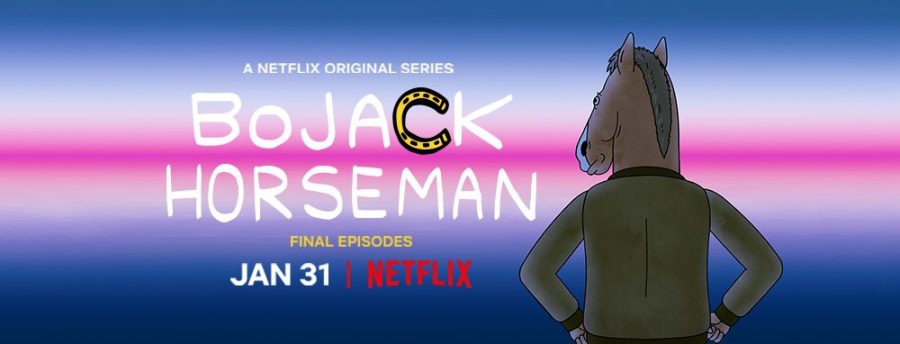This contains minor spoilers for the finale of “BoJack Horseman.”
“Sometimes life’s a bitch and then you keep on living.” These are the final words uttered in the show “BoJack Horseman.” The show’s second half of its final season was released to Netflix on Jan. 31, signifying the remarkable end for one of the best shows ever put to television. This final line, spoken by Diane Nguyen – one of the main characters – represents not only the show’s main theme, but how these characters have grown and developed over the course of the last six seasons.
At first glance, “BoJack Horseman” is a difficult show to narrow down. In the current television and film climate, many viewers may be turned away by the stark contrast of its content, which often deals with darker themes and an admittedly humorous animated style. Using the cover of wacky animated animals with a mix of absurdist and slapstick humor, the show delves deep into themes of individuality, forgiveness and depression, along with many other subjects that are not often associated in a medium like this. However, this blending of styles elevates the show immensely as it allows for the satire and meta-commentary about Hollywood and its current political climate to be displayed fully in all of its insanity.
The first half of the final season of “BoJack Horseman” ended on a sour note. BoJack’s attempts at self-actualization and ideological improvement appeared to be crashing down as news of one of his grave and personal past mistakes were starting to come to light and directly impact someone that he loves. The second half of this season picks up right where the first left off, with BoJack making incremental progress in his steps towards redemption. However, as the show has firmly established in prior seasons, past mistakes do not go away and BoJack’s countless and often irredeemable acts are brought to the forefront.
The second half of this season directly tackles the fallout of these scandals that involve BoJack, as the severity of his actions is revealed to the world and subsequently the audience, all while new details of past events are disclosed, adding to the gravity of his decisions. Simultaneously, as BoJack’s life begins to spiral downward, the characters around him begin to slowly progress forward with their lives as they distance themselves further and further from the titular character. Diane, who was first introduced in the show as BoJack’s ghostwriter, moves out of Los Angeles and to Chicago with her boyfriend. It is there that she finally begins to tackle her long-standing depression and her self-doubt as a writer. Todd, BoJack’s friend, attempts to repair the strained relationship with his mother while finding someone who is accepting of his sexuality and zany character. Princess Carolyn, BoJack’s long term agent, and on-again-off-again lover, learns how to balance her career and her time as a mother. Finally, Mr. Peanutbutter, BoJack’s ideological opposite, begins to fix the faults in his character. The cruel irony of the show is that as characters distance themselves from BoJack, and as he agonizingly ruins his chances of redemption, their lives dramatically improve.
Entertainment wise, the show is at its greatest in this second half of the season with elevated humor, animation and emotional beats. The closure of these characters feels natural and earned, with no remaining questions or loose ends. As Diane states in the final line of the show, “Sometimes life’s a bitch and then you keep on living,” the characters have endured countless heartbreaks and setbacks, yet ultimately time’s arrow marches on and life moves forward; the exact theme of the show.
The show ends not with BoJack becoming an entirely new and better person, but instead in the middle of a conversation between himself and Diane realizing they would be better off without each other, and BoJack coming to terms with this mutual realization. His road to redemption is far from complete as he still maintains some of his nihilistic thinking. However, it is the small changes, the understanding that he has done wrong and that it can be fixed, that he can be a better person, is how the show ends. There are no grand gestures or final revelations that are standard with other shows that feature complex and broken main characters. To have a narrative element like that would be lying to the shows main identity; people and relationships are complicated and morally gray. The show ends on a quiet moment – there is no dialogue and the audience is left to reflect on the journey and what is to come.
“BoJack Horseman” is one of the best forms of media ever created. Its narrative highs stand with the best and its complicated characters and themes shed light on personal development and redemption. It is a show that should be watched by all as it contains something for everyone. Anyone can learn something from this show, and anyone can use the lessons and life experience of the characters to help them in their own lives.
Tyler Clardy is a Collegian columnist and can be reached at [email protected]




















